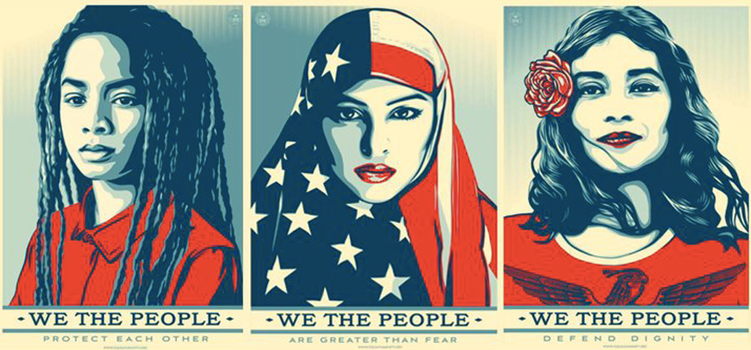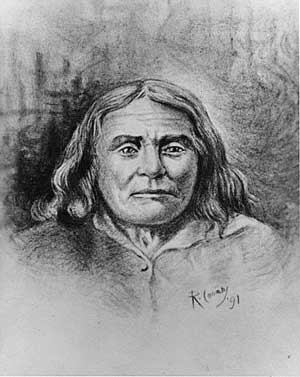To end, Anne Hutchinson was a figure that changed the way in which American's view their own liberty. She decided that she was able to talk to her God by herself, without an institution to give her faith. The decision to not follow the religious laws and doctrines of John Winthrop's theocracy, helped create a conflict and then her trial. Anne had to argue for her own conscience and beliefs to her community. She began a debate on religious tolerance and free speech. This fervor was to later shape the way in which Americans practiced their religious convictions and convictions towards government.
lbjws.blogspot.com/2015/11/american-biography-1637-massachusetts.html
http://www.pbs.org/godinamerica/people/anne-hutchinson.html
http://www.history.com/topics/anne-hutchinson
http://www.pbs.org/godinamerica/people/john-winthrop.html
Written, Produced and Directed by
David Belton
Co-Produced by
Cathleen O'Connell
Callie T. Wiser
Principal Cinematography by
Tim Cragg
Edited by
Chyld King
[The words spoken by the actors in this film are from transcripts, sermons and personal journals of the characters they portray.]
ANNOUNCER: Beginning tonight, a special series exploring how religious faith and the quest for religious liberty has shaped public life in America for over 400 years.
- You can't divorce faith from the American experience. It really is our historical and cultural DNA.
ANNOUNCER: This is the dramatic history of the struggle for faith and freedom, rewritten by war, by politics and by spiritual imagination.
- We've had this notion, from the very beginning of American life, that this is a special place and what makes it special is that we have some kind of special relationship with God.
ANNOUNCER: It is the story of how Europeans' attempts to convert native Americans was met with violent rebellion, how the Puritans fled religious tyranny in the Old World to build a more perfect society in the new.
JOHN WINTHROP: We must consider that we shall be as a city upon a hill.
ANNOUNCER: And how new waves of immigrants demanded their religious freedom.
- Hughes genuinely felt that the public schools were engines of converting Catholics into Protestants.
ANNOUNCER: It is the story of faith, the Civil War, and a president's private spiritual journey.
- Lincoln decided that the war had been decreed by God.
ANNOUNCER: And the religious foundation of Civil Rights.
Rev. MARTIN LUTHER KING, Jr.: I just want to do God's will, and he has allowed me to go up to the mountain!
ANNOUNCER: It is a story of spiritual awakenings and political awakenings.
Pres. RONALD REAGAN: I know that you can't endorse me, but I endorse you.
ANNOUNCER: Of the freedom to believe and the struggle to be free from belief, of the quest for truth, faith and power in the most religiously diverse nation on earth.
Pres. BARACK OBAMA: We are a nation of Christians and Muslims, Jews and Hindus and non-believers.
ANNOUNCER: It is a complex history full of surprises and insights, a fresh and challenging journey through the American story.
Tonight, Part One of God in America.
THE NEW ADAM
NARRATOR: When the first Europeans came to the New World, they brought with them Christian traditions and beliefs that had endured for more than a thousand years. But in this new land, religion would be forced to change.
STEPHEN PROTHERO, Professor of Religion, Boston University: It's this new place, the New World, the new Jerusalem, the new Israel, whatever you might call it, but "new'' is the operative word. And that's being made here. And what's being made is precisely up for grabs.
NARRATOR: This is the story of America's struggle from old religion to new.
STEPHEN PROTHERO: There was this idea that we are the new Adam and the new Eve. We are these new people, and we're being made by this new environment. And that's what we're sort of straining toward early on, some new kind of narrative, some new kind of story that we, as Americans, can tell that is going to be a story of us in relationship to God.
NARRATOR: A story that would change American religion forever and help give birth to Americans' identity.
A century after Christopher Columbus came to the New World, the first Spaniards reached the land that they would call New Mexico. Their conquistadors came in search of silver, their missionaries came to save heathen souls.
Father JACK ROBINSON, Franciscan Friar: It was important. This was life and death. Not simply life and death here on earth, this was eternal life and eternal damnation.
NARRATOR: For they believed theirs was the true path to salvation.
Father JACK CLARK ROBINSON: "I'm supposed to go to places where they haven't heard this story before and share this story, share this Gospel message, because I believe it's true.''
NARRATOR: But the people the Spanish encountered had their own religious traditions. For more than a thousand years, the Pueblo Indians had led a spiritual life that had flourished among the hills and valleys of the Rio Grande.
PORTER SWENTZELL, Santa Clara Pueblo: Our whole world around us is our religion. Our way of life is our religion. The way we behave towards one another and towards others- that's our religion, you know? The very moment we wake up in the morning to the moment we that go to bed, and even when we're asleep, you know, that's our religion.
NARRATOR: The Spanish began to settle on Pueblo lands.
PORTER SWENTZELL: We welcome people coming to visit, give them food. We provide them a place to stay. That's the kind of hospitality that they met the Spanish that were coming in with. They were looking for that the Spanish would see what kind of people they are and respond in kind. They never did reciprocate that kind of relationship.
NARRATOR: Within a decade, the Spanish had built more than 40 Catholic churches. The Franciscan friars conducted daily Mass, and the Pueblos came.
PORTER SWENTZELL: The Pueblos were not closed saying, "Our way is the only right way.'' When the Church came in, the Peublos said, "Hey, we'll go to your Mass and listen to what you have to say.'' And so the Spanish thought that was a willing acceptance of Catholicism.
NARRATOR: But the Pueblos had no intention of letting Christianity take the place of their own religion.
Father JACK CLARK ROBINSON: The Pueblos could say, "We'll add the blessed mother. We'll add the baby Jesus.'' There was obviously some confusion because the friars didn't realize that they were being- that they were an addition rather than a replacement.
NARRATOR: But the Franciscan priests saw no room for any other religion. Eternal damnation, theirs and the Pueblos, was at stake. Catholicism was the only religion that could save the native souls. By the early 1600s, they began to report that hundreds of Pueblo Indians were converting, but the Pueblos themselves saw things differently.
JOSEPH H. SUINA, Historian, University of New Mexico: The Catholic Church was saying one true God, and no others. Well, it's not that way with Pueblo religion. You know, it's- we don't think that there's one true God for all people in the world.
JOE A. GARCIA, Okhay Owingeh Pueblo: Converting means you let go of your way and you take on another way. And I don't believe that happened ever.
NARRATOR: Some friars began to notice that even many converted Pueblos continued to practice their own religion. They demanded that the colony's soldiers enforce their one true faith. Native ceremonies were banned, religious icons burned, sacred places of worship destroyed.
JOSEPH H. SUINA: As far as you could go in terms of saying, "Look, forget it. This is not going to ever be again. This is what we think about your religion.''
Father JACK CLARK ROBINSON: It was a time of militancy about your faith, and the friars brought that with them. "We have the truth. This is the truth. This is the truth that the whole Spanish empire is behind me supporting. I'm going to get this truth in there.''
NARRATOR: Some priests became notoriously brutal. One beat a Pueblo man so badly, the victim was described as bathed in blood. The breaking point came in 1675. Forty-seven Pueblo religious leaders were imprisoned in Santa Fe for sorcery. One of them was a man called Po'pay from the Okay Owingeh pueblo. He was publically flogged, but three others were dragged before their people and hanged.
JOSEPH H. SUINA: It got to that point when about the time he was in prison, when things were really getting worse, you know, and so for him, this was- this was time to do something.
NARRATOR: Po'pay sent a message to the Pueblo tribes calling for war.
PO'PAY: I say to you, my brothers, go to your owingehs. Wait further word. Senge de ho.
NARRATOR: Two thousand Pueblo Indians descended on the Spanish. Hundreds died in the fighting, but it was the Catholic priests who were specifically targeted. More than half their number were murdered. It was August 10th, 1680. Ten days later, the Spanish fled New Mexico.
The Catholic empire had faltered. It was a sign that European religion would not survive unchanged in the New World.
JOHN WINTHROP: For we must consider that we shall be as a city upon a hill. The eyes of all people are upon us.
NARRATOR: On the harsh and rocky shores of Massachusetts, a small group of men and women had already begun the struggle to create a new Christian community. The Puritans who came to America in 1630 were fired by a zeal to save Christianity from the corruption of a European church.
STEPHEN PROTHERO, Professor of Religion, Boston University: They're carrying with them this story, "We're leaving because we're going to remake Christianity. We're leaving because we're going to remake the world.'' And so it gives them a sense of specialness. "We're the chosen people.'' And then they come over here and they act that way. They start to act like they're the Israelites. You know, they've gone across the ocean. You know, they've escaped the Pharaoh.
NARRATOR: They had been persecuted for accusing their king of failing to cleanse the Church of England of Catholicism. They had been hounded as radicals for their fervor for the Protestant Reformation.
STEPHEN PROTHERO: The whole point of reformation was to make Christianity right, to bring it back to the beginning, bring it back to its pure origins, bring it back to the Bible. And the Church of England wasn't doing enough of that. And so that's where they got their name from, the Puritans. They were going to purify the church.
NARRATOR: The burden of creating this "godly enterprise" fell on the shoulders of John Winthrop, a provincial lawyer in England but now governor of the new colony.
JOHN WINTHROP: The Lord will be our God and delight to dwell among us. The Lord will be our God and delight to dwell among us as his one people.
MICHAEL P. WINSHIP, Historian, University of Georgia: When he committed himself to the colony in 1629, he committed himself all the way. I mean, he had a profound determination to see the colony succeed.
STEPHEN PROTHERO: The New Englanders were aware that there had been other efforts, like at Jamestown, that was a miserable failure, and they didn't want theirs to be a miserable failure. And they knew that the odds were against them. You know, they knew that the climate was difficult. They knew that it was going to be hard to get agriculture going. And Winthrop- he's the father to all these people in some very important way, and he's in charge of them. And if things screw up, it's sort of on his shoulders.
NARRATOR: As governor, Winthrop was careful to record the events of his Bible Commonwealth. His journals, he hoped, would be testament to the mission's success. The colony would shine like a beacon back to the Old World, a lesson in how Christianity should work.
JOHN WINTHROP: For we must consider that we shall be as a city upon a hill. The eyes of all people are upon us. So if we deal falsely with our God in this work we have undertaken, and so cause him to withdraw his present help from us, we shall be made a story and a byword through the world.
NARRATOR: That first winter, nearly half the Puritans froze to death or starved. The colony was on the brink of collapse. They feared it was a sign that they had not been pious enough, had not prayed hard enough, that their God had abandoned them.
STEPHEN PROTHERO: The fate of the society hung on the religiosity of the society, you know? And if they turned away from God, God would turn away from them. If then- you know, "If we are good, then God will bless us and we will prosper. And if we don't, if we screw up, if we start to fight with one another, if we start to seek our own ends, God will turn on us and this will be a total miserable failure.''
[www.pbs.org: More on the Puritans]
NARRATOR: If even one offended God, the whole colony could perish. Laws governing behavior were strictly enforced. Those who questioned the religious laws of the colony risked banishment into a hostile wilderness.
FRANK LAMBERT, Historian, Purdue University: The ideal was conformity. The ideal was to have a single, pure, orthodox community in which everybody conformed to the true religion.
NARRATOR: But Governor Winthrop faced an impossible dilemma. His colony depended on absolute conformity for its survival, but this contradicted what lay at the heart of Puritan religion.
STEPHEN PROTHERO: The Puritan experiment of saying, "We're going to do something totally new'' starts out with this impulse of giving authority back to the individual, right? The Catholics are saying, "OK, the Pope will tell you how to read the Bible. The Pope will tell you how to be a Christian.'' And Protestants say, "No, no, no, no, no! Pope? That's not the Pope's job. We can read the Bible for ourselves. We will see how God tells us how to be.''
That's the Protestant imagination that's inside these Puritans who are coming over. It's a rebellious notion. But it's also a dangerous notion. I mean, how are you going to set up a society where everybody is reading the key document? If everybody can read the Bible for themselves, how are you going hold society together, right?
NARRATOR: And it would not be long before one person's ideas about God would threaten to tear apart Winthrop's fragile colony.
MICHAEL WINSHIP: At the end of 1634, Anne Hutchinson and her husband arrive in Boston.
MARY BETH NORTON, Historian, Cornell University: She was the daughter of a clergyman. That's all we know. But she must have been very well educated by her father or someone else. She knew her Bible. She could match scriptural references with anybody. And she was clearly very, very smart and very independent.
NARRATOR: Educated and well-off, Anne Hutchinson quickly became a prominent member of Boston society.
MARY BETH NORTON: There usually was a high-status woman present at births, and Anne Hutchinson was that person for Boston.
NARRATOR: As mother of 11 children, she was a reassuring presence to women facing the perils of childbirth.
MARY BETH NORTON: And so she participated in childbirth gatherings called "gossipings," and it was in that context that she began to spread her own ideas among the women of Boston.
NARRATOR: Hutchinson had a riveting story to tell- God had spoken to her directly.
MICHAEL WINSHIP: She's having an intense prayer session, and then this verse rises up in her mind. And the first part of this verse she interprets as God saying to her, "You're among the saved. This is it. This is my message to you.''
NARRATOR: But for Puritans, being "saved'' could never be guaranteed. Since Adam's fall, man was born damned, hell his destiny. The only hope of God's salvation required Puritans to devote themselves to studying their Bible and to live a pious life. To understand God's will was a lifetime's struggle.
MARY BETH NORTON: Puritans were supposed to wrestle with this idea. They were never supposed to be sure that they are saved. And Anne Hutchinson basically says to Puritans, "Yes, you can be sure. Yes, you can be sure if God speaks to you the way God has spoken to me.'''
NARRATOR: Hutchinson's story electrified her listeners. They gathered at her house to hear about her revelation from God, just yards from where the governor lived.
JOHN WINTHROP: She keeps open house for all comers, three score, four score people. She comments upon the doctrines, interprets all passages at her pleasure and expounds dark passages of Scripture.
NARRATOR: As much as Winthrop disliked her talk of messages from God, Hutchinson was a good Puritan and had broken no law.
STEPHEN PROTHERO: This is what makes her so dangerous is because she is speaking the language of Puritanism itself- "The drama is happening inside each of us. God is speaking to each of us. We need to listen to that voice of God inside us.''
NARRATOR: And as Hutchinson's popularity grew, Winthrop feared for the future of his colony.
JOHN WINTHROP: Her doctrine appeals to many profane people because it is a very easy and an acceptable way to Heaven, to see nothing, to have to do nothing but wait for Christ to do all.
NARRATOR: Hutchinson's easy path to heaven undermined Winthrop's orderly society. He needed his people to struggle with their salvation.
STEPHEN MARINI, Historian of Religion, Wellesley College: It is relentless, difficult, arduous on the individual level. But it is fantastic social glue if everyone is doing this. Everyone notices everything. Everyone has an opinion and a moral judgment on everybody else, on the criteria of what God's law says. It will hold together church, family, state.
NARRATOR: Hutchinson's challenge to official doctrine threatened to destroy Winthrop's fledgling colony.
STEPHEN PROTHERO: What happens if you start to lose control of your society and you're John Winthrop, right? You need to be able to say, "No, no no, that's not what the Bible says. The Bible says such and so. This is how we should run our society.''
NARRATOR: Anxious ministers visited Winthrop. John Eliot from Roxbury, and from Salem, Hugh Peters, reported that some members of their congregations preferred to listen to Hutchinson's biblical interpretations to theirs.
STEPHEN PROTHERO: Why listen to the black-coated minister read a dry, boring sermon when you can go to Anne Hutchinson's house and hear this heartfelt, real thing?
NARRATOR: And Hutchinson was gaining powerful allies who were attracted to her message- the minister John Wheelwright and Henry Vane, a fierce political adversary of John Winthrop's.
JOHN WINTHROP: I observe first her success. She had in a short time insinuated herself into the hearts of much of the people, who grew into so reverent an esteem of her godliness and spiritual gifts, as look at her as a prophetess.
STEPHEN PROTHERO: And that's where the Puritan men, who are running the society, say, "No no no no. God speaks through the Bible, and the Bible is mediated through us.''
NARRATOR: In November 1637, the General Court brought Anne Hutchinson to trial. The charge was sedition.
MICHAEL WINSHIP: Her sense of possession, her sense of self-confidence, her absolute refusal to be intimidated is extraordinary.
JOHN WINTHROP: Mrs. Hutchinson, you are called here as one of those that have troubled the peace of the commonwealth and the churches here. You have maintained a meeting and an assembly at your house which hath been condemned by the General Assembly as a thing not tolerable in the eyes of God nor fitting for your sex.
ANNE HUTCHINSON: I hear no things laid to my charge.
JOHN WINTHROP: I have told you some already. And more I can tell you.
ANNE HUTCHINSON: Name one, sir.
JOHN WINTHROP: Have I not named you some already?
ANNE HUTCHINSON: What have I said or done?
JOHN WINTHROP: You have joined with them in the faction.
ANNE HUTCHINSON: In what faction did I join with them?
JOHN WINTHROP: You have counseled them.
ANNE HUTCHINSON: Wherein?
JOHN WINTHROP: Why, in entertaining them.
ANNE HUTCHINSON: What law have I broken?
MICHAEL WINSHIP: Her initial defense is to nitpick absolutely everything that's thrown at her. He hasn't thought out his prosecution, and then she rips him to shreds. You read the transcript and you just watch him squirming with frustration.
JOHN WINTHROP: We find it greatly prejudicial to the state to seduce many honest persons who are called to these meetings. Your opinions, being different from the word of God, may seduce simple souls who resort unto you.
ANNE HUTCHINSON: Sir, I do not believe that to be so.
JOHN WINTHROP: Well, we then see how it is that we must therefore put it away from you or restrain you from making this course.
ANNE HUTCHINSON: If you have a rule for it from God's word, you may.
JOHN WINTHROP: We are your judges, not you ours! And we must compel you to do it.
ANNE HUTCHINSON: If it please you by authority to put it down, I freely let you for I am subject to your authority.
[www.pbs.org: Read the trial transcript]
NARRATOR: The court adjourned for the night.
MARY BETH NORTON, Historian, Cornell University: He's accustomed to questioning people. He's accustomed to questioning miscreants who've come up before him. He's accustomed to getting confessions. That's what magistrates did. They got confessions. He can't get a confession out of her. It has to have been extraordinarily frustrating for him.
NARRATOR: For John Winthrop, the day had been a disaster. But overnight, the situation was to change dramatically. No one knows why Anne Hutchinson changed her approach to the trial, but the next morning she arrived in court determined to share the truth that God had revealed to her.
MARY BETH NORTON: It's definite hubris. Absolutely. But she's convinced that she knows the truth. And in the end, that's her downfall.
ANNE HUTCHINSON: If you please to give me leave, I shall give you the ground of what I know to be true. I bless the Lord. He hath let me see which was the clear ministry and which the wrong. Since that time, he hath let me distinguish between the voice of my beloved and the voice of Moses, the voice of John the Baptist and the voice of the antichrist. Now, if you condemn me for speaking what in my conscience I know to be truth, I must commit myself unto the Lord.
THOMAS DUDLEY, Deputy Governor: How do you know that that was the Spirit?
ANNE HUTCHINSON: How did Abraham know that it was God who bid him offer his son?
THOMAS DUDLEY: By an immediate voice.
ANNE HUTCHINSON: So to me by an immediate revelation.
THOMAS DUDLEY: By an immediate revelation.
ANNE HUTCHINSON: You have power over my body, but the Lord Jesus hath power over my body and soul. And assure yourselves this much, if you go on in this course, you will bring a curse upon you and your posterity, and the mouth of the Lord hath spoken it.
MARY BETH NORTON: She dares to say that God has told them that if they do anything to her, they will be doomed to all eternity. They're not about to listen to that revelation.
JOHN WINTHROP: I am persuaded that the revelation she brings forth is delusion. Mrs. Hutchinson, the sentence of the court you hear is that you are to be banished from out of our jurisdiction as a woman not fit for our society. You're to be imprisoned until the court shall send you away.
ANNE HUTCHINSON: I desire to know what reason I am to be banished.
JOHN WINTHROP: The court knows the reason and is satisfied.
NARRATOR: In the spring of 1638, Anne Hutchinson and her family were forced to leave the colony forever. But her influence would outlive both her and John Winthrop.
STEPHEN PROTHERO: Anne Hutchinson is the future in the sense of religious conscience, in the sense that conscience speaks out against the state. And so the America that's going to be founded later on is going to make room for Anne Hutchinson. We're not going to banish her. We're not going to put her in jail. But she's also the future in the sense of this, "Religion really happens inside us,'' you know, that "the drama is inside us. And God can speak to any of us.'''
NARRATOR: But it would be more than a century before America would become fertile ground for Anne Hutchinson's ideas. And it would await the arrival of more than a million people of different nations and faiths.
Lutherans, Baptists, Presbyterians, Anglicans, Quakers, Anabaptists, Jews, Methodists, Catholics- all came seeking to recreate themselves in a land that was still taking shape.
STEPHEN PROTHERO: People coming over here are disconnected from their homes, from their traditions, from their jobs, from their extended families. And they're coming over to this new place. And it's almost like there's this whisper in the ear of the colonists and the early Americans, "Who are we? Who are we Americans who come from such different places and have so many religious backgrounds? And what's the story that we're playing out?''
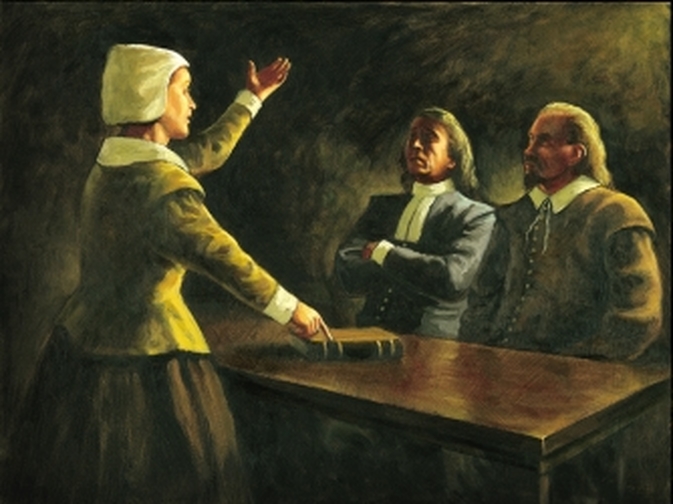
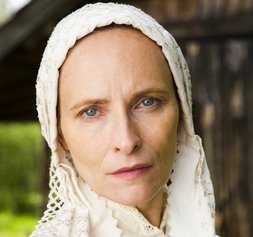
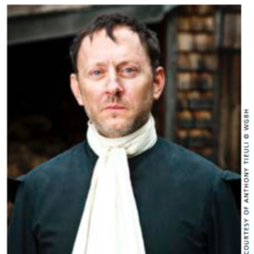
 RSS Feed
RSS Feed
